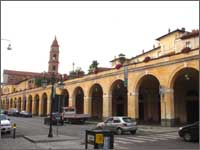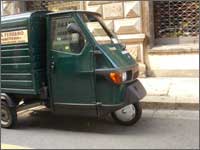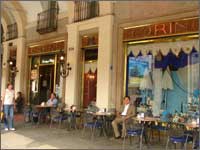Today's Notables
My Observations of Italy, Part 1
October 2007
Hisashi Furuichi
President and C.E.O.
In an article entitled "Shoku no Daigakuin" (translated , "Master course of Cuisine") on July 18th, 2007 that appeared on the Asahi News website, the Ministry of Economy, Trade and Industry announced plans to implement a overall study of Japanese food at a "University" , be located in Osaka. Mr. Yoichi Hosokawa of the METI Kansai Bureau Planning Office stated, "In Europe and the US, universities and graduate schools have been established for the sole purpose of studying the cuisine and food of the local country. We want to use this as an opportunity from Kansai to teach the world about the rich heritage of Japanese food." The article also stated that plans are underway to establish by 2010 a university to not only study the history of Japanese food but the role food offerings as a part of culture.
Perhaps my experience is unique in that I have had the opportunity to study cuisine and restaurant management in the US during my tenure at PRIMIX's affiliate company, FMI, and then have continued working in the food industry after returning to Japan. One thing I have noticed working in the food and restaurant industry is that compared to the rest of the world, Japan's industry lacks the clearly defined layers in human resources that exists in other countries. One might assume that this is caused directly by a relative lack of education in the food industry. In the US, for example, there are over 400 universities that offer programs in hotel, restaurant and institutional management. If you include community colleges, there are over 600 schools. Of the 686 total universities (according to Ministry of Education, Culture, Sports, Science and Technology in 2002) in Japan, none offer a degree or field of study in hotel and restaurant management. In the US, there are more than 100 schools that offer extension programs at culinary schools, allowing students to earn a bachelor's degree at the university level. There are also universities that offer completely different programs in food science that are independent of agricultural programs. From my perspective, Japan is far overdue in offering such programs and degrees in this area of study.
I was glad to see that my hopes were being answered when I received a request by the METI in Kansai mentioned earlier. Initially they were interested in learning more about hotel/restaurant management programs in the US and had learned that I was familiar with such programs. At some point, they invited me to accompany them to a school in Italy called the University of Gastronomic Sciences. How could I possibly refuse a duty to my country and my hometown so upon approval of our board, I was soon on my way to a small town called Bra, Italy which is located on the outskirts of Turin, for a 3 night, 5 day stay. Although I've been to Germany a number of times, and Milan, Italy, on business with FMI, it was the first time I've been to Turin.
After arriving in the airport, our group immediately got a rental car and headed for Bra. It seemed to take forever to get through the car rental procedure. I thought it took a lot of time in the US but as my impatience grew, I realized that Italians were worse. Since it took so much time to get through the process, I forgot to ask the most important question-directions to the hotel-and left in the rental car. Without a clue of which way to go, we soon found ourselves back inside the airport complex, asking directions at a gas station. One other person from the think tank that was working to establish the University of Cuisine had also spent time in the US and had the same idea I did. He thought that we would be able to find our way by reading directions and street signs. But we couldn't understand the street signs and the attendant at the gas station may have had good intentions with his English but we soon ran into a language problem. Without much option, we decided to rely on raw intuition and without really getting lost too bad, we arrived at the hotel. I must say, we didn't do too bad given the fact that we had never been there before.
The population of Turin is about 1.7 million people, making it Italy's fourth largest city, but it doesn't have the same hustle and bustle of a big city. The government in Italy strictly regulates historical buildings, even those owned by individuals. Since buildings are not so easily torn down and are nicely preserved, sightseeing is a true delight. Many roads are made of brick and it is not out of the ordinary to see railways that go right through buildings. If the name Turin rings a bell, you may remember that it was host to the Winter Olympics last year where Shizuka Arakawa won the gold medal in figure skating.
 Old City |
 Tricycles, hardly ever seen in Japan, still being used in Italy |
 400-year old Cafe (Cafe Turin) |
HOME > What’s New > Today's Notables > Details














